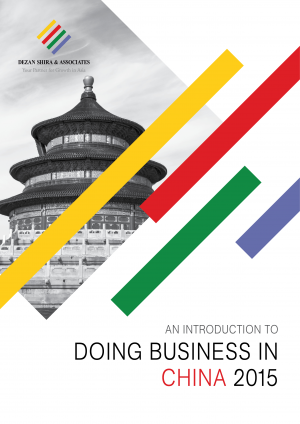China’s Commercial Healthcare Insurance Industry on the Fast-track
 Editor: Rainy Yao
Editor: Rainy Yao
Today, over 95 percent of Chinese citizens are enrolled in various public health insurance plans, thanks to the country’s healthcare reform. However, the scope of public insurance coverage is far less than adequate with low reimbursement rates – patented medicine, usage of high-end medical devices and special needs are usually not covered. The Chinese government is also concerned with its ability to sustain the social welfare system due to its rapidly aging population. The country just released a proposal to extend its mandatory retirement age, first change since the 1950s, in a move to ease social and fiscal pressures.
The existing gaps in public insurance coverage, together with China’s effort to boost investment in the private healthcare insurance sector, have opened up attractive opportunities for foreign insurance companies. In 2014, the size of China’s commercial healthcare insurance market totaled RMB 158.7 billion, up 41 percent compared to the previous year. This record was broken in August this year, with the sector’s revenue reaching RMB 160 million from January to August alone. The average growth rate of the commercial healthcare insurance market is approximately 25 percent since 2000. Now, more than 100 insurance companies are providing commercial healthcare products in China.
Here we introduce the most recent tax incentives that would encourage employers to buy health insurance for their employees, and help foreign insurers to choose the right market entry strategy.
 RELATED: Pre-Investment and Entry Strategy Advisory
RELATED: Pre-Investment and Entry Strategy Advisory
Individual Income Tax Incentives
On November 27, China’s Ministry of Finance, together with the State Administration of Taxation (SAT) and China Insurance Regulatory Commission (CIRC), has decided to expand a trial program of individual income tax (IIT) reduction on commercial healthcare insurance to cover 31 cities of China, including Beijing, Shanghai, Tianjin, Chongqing and certain second-tier cities in other provinces (hereinafter referred to as the “pilot cities”). Specifically:
- The expenditure incurred by individuals in the pilot cities from purchasing qualified healthcare insurance products is permitted to be deducted before IIT collection capped at RMB 2400 per year (or RMB 200 per month).
- Companies that are established in the pilot cities who purchase healthcare insurance for their employees will be deemed as individual purchasing and thus shall enjoy the same tax incentives.
The policy is currently still invalid and will take effect on January 1, 2016. Previously, the pilot program was only implemented in four major cities in China. The new document also further clarifies the definition of “qualified healthcare insurance products,” stipulating that the insurant should be at least 16 years old and under the mandatory retirement age. Meanwhile, the medical loss ratio (MLR) should be higher than 80 percent.
Qualified Insurance Company
The CIRC stipulates that insurance companies who provide the above-mentioned healthcare insurance products need to meet the following criteria:
- The company’s solvency ratio is not less than 150 percent in the latest two years;
- No administrative penalty within the latest three years;
- Insurance companies that are not professional healthcare insurance companies should set up a special healthcare insurance department;
- The company has an independent healthcare insurance information supervision and management system; and
- Employees that have work experience in healthcare insurance sector should account for at least 50 percent of the company’s total employees, meanwhile, employees with a medical background should account for more than 30 percent of its total employees.
Government’s Support Plan and Market Entry for Foreign Players
In October 2014, the State Council released the “Several Opinions on Promoting the Development of the Healthcare Service Industry” (Guofa [2014] No. 29), which puts forward several development goals for the country’s healthcare industry to achieve by 2020. The Opinions explicitly state that market entry requirements for the healthcare service industry will be relaxed, and an open, transparent, equal and standardized access system for the healthcare service industry will be established.
Currently, foreign investors are allowed to set up wholly foreign-owned insurance companies (shares owned by a foreign party in a life insurance company are capped at 50 percent) in China, based on the latest Guidance Catalogue for Foreign Investment Industries. Apart from the regular business setup procedure, an insurance company also needs to file with and get the approval from the CIRC.
|
Asia Briefing Ltd. is a subsidiary of Dezan Shira & Associates. Dezan Shira is a specialist foreign direct investment practice, providing corporate establishment, business advisory, tax advisory and compliance, accounting, payroll, due diligence and financial review services to multinationals investing in China, Hong Kong, India, Vietnam, Singapore and the rest of ASEAN. For further information, please email china@dezshira.com or visit www.dezshira.com. Stay up to date with the latest business and investment trends in Asia by subscribing to our complimentary update service featuring news, commentary and regulatory insight. |
![]()
 An Introduction to Doing Business in China 2015
An Introduction to Doing Business in China 2015
Doing Business in China 2015 is designed to introduce the fundamentals of investing in China. Compiled by the professionals at Dezan Shira & Associates, this comprehensive guide is ideal not only for businesses looking to enter the Chinese market, but also for companies that already have a presence here and want to keep up-to-date with the most recent and relevant policy changes.
 China Investment Roadmap: The Medical Device Industry
China Investment Roadmap: The Medical Device Industry
In this issue of China Briefing, we present a roadmap for investing in China’s medical device industry, from initial market research, to establishing a manufacturing or trading company in China, to obtaining the licenses needed to make or distribute your products. With our specialized knowledge and experience in the medical industry, Dezan Shira & Associates can help you to newly establish or grow your operations in China and beyond.
 Adapting Your China WFOE to Service China’s Consumers
Adapting Your China WFOE to Service China’s Consumers
In this issue of China Briefing Magazine, we look at the challenges posed to manufacturers amidst China’s rising labor costs and stricter environmental regulations. Manufacturing WFOEs in China should adapt by expanding their business scope to include distribution and determine suitable supply chain solutions. In this regard, we will take a look at the opportunities in China’s domestic consumer market and forecast the sectors that are set to boom in the coming years.
- Previous Article Navigating Restrictions in China’s Film Industry
- Next Article Market Entry Strategies for Private K-12 School Service Providers in China
























